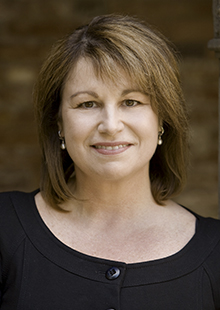Reconceptualizing Sexual Harassment
Vicki Schultz
Ford Foundation Professor of Law and Social Sciences
Vicki Schultz is the Ford Foundation Professor of Police force and Social Sciences at Yale Police force School. An adept in law and social science, the workplace, bigotry, and the family unit, she has written and lectured widely on a multifariousness of subjects, including sexual harassment, sex segregation on the chore, work-family problems, working time, the meaning of work in people'south lives, household labor, same-sexual activity marriage, and matrimony generally.
Full BIOGRAPHY

Pedagogy & Curriculum Vitae
J.D., Harvard Police School
B.A., University of Texas
- Curriculum Vitae
Courses Taught
- Employment Bigotry Law
- Family unit Law
- Family, Country and Marketplace
- Workplace Theory and Policy
- Work and Gender
- Police force and Social Scientific discipline
- Feminist Theory
Vicki Schultz is the Ford Foundation Professor of Law and Social Sciences at Yale Law School, where she teaches courses on the family, state and market, family unit police force, employment discrimination law, workplace theory and policy, piece of work and gender, constabulary and social science, feminist theory, and related subjects. Schultz has written and lectured widely on a multifariousness of subjects related to antidiscrimination constabulary, including sexual harassment, sexual activity segregation on the job, work-family problems, working hours, and the pregnant of piece of work in people's lives. She has also lectured on family law and intimate life, including topics related to aforementioned-sex spousal relationship and marriage generally. Her published piece of work includes "Feminism and Workplace Flexibility," 42Connectitcut Law Review 1203 (2010),"The Sanitized Workplace Revisited," in Martha Fineman, Jack Jackson and Adam Romero, eds., FEMINIST AND QUEER LEGAL THEORY (2009), "Sex and Work," 18Yale Journal of Law and Feminism 223 (2006), "The Demand for a Reduced Workweek in the U.s.a.," in Judith Fudge & Rosemary Owen, eds., THEORY PRECARIOUS Work, WOMEN, AND THE NEW Economic system: THE Challenge TO LEGAL NORMS (2006), "The Sanitized Workplace," 112Yale Law Journal 2061 (2003), "Life's Work," 100Columbia Constabulary Review 1881 (2000), "Reconceptualizing Sexual Harassment," 107Yale Law Journal 1683 (1998), and "Telling Stories About Women and Piece of work: Judicial Interpretations of Sex Segregation on the Job in title Vii Cases Raising the Lack of Interest Argument," 103Harvard Constabulary Review 1749 (1990).
Professor Schultz is currently working on an intellectual history of antidiscrimination law, "Antidiscrimination as Disruption," that lays out the historical conceptual frameworks for understanding and addressing discrimination and then traces the emergence of a new framework that treats the formation of social identity as a fluid process in which institutional dynamics play a significant role. With co-author Michael Yarbrough, she is also writing an commodity, "Volition Marriage Make Gay and Lesbian Couples Less Egalitarian? A Cautionary Tale," that analyzes the likely furnishings of legal marriage on the division of housework and childcare in gay and lesbian households. At the middle of this commodity are the questions: what is marriage and what work does it do?
Schultz'southward work has been influential in scholarly circles in both police and the social sciences; her work has also been cited widely in the courts and the national news media. She has been quoted inThe New York Times Magazine,The New Yorker,Ms. Magazine, and many major newspapers; she has appeared onThe News Hr with Jim Lehrer,The CBS Evening News,ABC World News Tonight,Good Morn America, and National Public Radio.
Schultz has held a number of significant professional posts, fellowships and visiting professorships. She is a past president of the Labor and Employment Section of the Association for American Law Schools and a past Trustee of the Law and Gild Association. She has been the Evelyn Dark-green Davis Fellow at the Radcliffe Plant for Advanced Study at Harvard University, a beau at the Heart for the Advanced Study of the Behavioral Sciences at Stanford University, and a fellow at the Whitney Humanities Center at Yale University. She has been a visiting professor at Harvard Law Schoolhouse (her alma mater), and in 2010-2011, she was the MacDonald-Wright Visiting Professor of Constabulary and Faculty Chair of the Williams Found at the UCLA School of Police. A quondam trial chaser at the U.s. Department of Justice, Ceremonious Rights Partition, Schultz began her academic career at the University of Wisconsin Law School, where she became interested in law and sociology. At Yale Law School, she runs the Workplace Theory and Policy Workshop and has also headed the Piece of work and Welfare group, an interdisciplinary group of scholars who written report inequalities produced by dissimilar social welfare regimes, labor marketplace institutions, and family unit formations. Schultz lives in Connecticut with her girl Natalie and their true cat Jack.
Thursday, Feb 3, 2022
NFL Caput Coach Alleges Widespread Racial Discrimination
The Dispatch
Ford Foundation Professor of Law and Social Sciences Vicki Schultz is quoted in a report about the form-action lawsuit filed by sometime Miami Dolphins head coach Brian Flores against the NFL for discriminatory hiring practices.

Friday, November 5, 2021
Professor Schultz Launches Civil Rights Constabulary Projection and New Seminar
A new projection led past Professor Vicki Schultz and involving Yale Law students volition examine the early work done by lawyers in the U.Southward. Department of Justice Ceremonious Rights Division, Employment Litigation Department (ELS) — and analyze what that work might have to say for electric current and future ceremonious rights police.


Midweek, April 15, 2020
Job Bigotry in Pandemic Tin Extend Past Asian Workers
Bloomberg Police force
Ford Foundation Professor of Law and Social Sciences Vicki Schultz is quoted in Bloomberg Police force about how the coronavirus pandemic is affecting workplace discrimination claims by racial minorities and the disabled.
Thursday, August 15, 2019
Five Decisions That May Sway High Court On LGBT Protections
Law360
Ford Foundation Professor of Law and Social Sciences Vicki Schultz is quoted on cases coming before the Supreme Courtroom that will examination whether sex bigotry extends to bias based on sexual orientation and gender identity.

Wednesday, February 28, 2018
When does bad behavior plough into sexual harassment?
Cincinnati Enquirer
Ford Foundation Professor of Law and Social Sciences Vicki Schultz is quoted in an article virtually the lines between bad beliefs and harassment in the workplace.
Wednesday, August 16, 2017
Shielded
Buzzfeed
Ford Foundation Professor of Constabulary and Social Sciences Vicki Schultz is quoted in an article about the difficulties of firing tenured professors.
Friday, June sixteen, 2017
The Surprising Sexism of Maternity Leave
Bustle
Ford Foundation Professor of Law and Social Sciences Vicki Schultz is quoted in an article about the disparity in parental exit rules for mothers versus fathers.
Friday, October xiv, 2016
Michelle Obama Was Right Virtually the History of Workplace Sexual Harassment
Time Magazine
Ford Foundation Professor of Law and Social Sciences Vicki Schultz is quoted and Nicholas deB. Katzenbach Professor of Law Reva Siegel '86 is cited in an article well-nigh the history of sexual harassment law. Irving South. Ribicoff Visiting Professor of Police force Joseph Fishkin '07 is also quoted.
Open Statement on Sexual Harassment from Employment Discrimination Law Scholars, 71 Stan. L. Rev. Online 17 (2018).
Reconceptualizing Sexual Harassment, Again, 128 Yale Fifty.J.F. 22 (2018).
Taking Sex activity Bigotry Seriously, 91 Denver U. L. Rev. 995 (2015) (Atomic number 82 article in symposium result, Revisiting Sex: Gender and Sex activity Bigotry Fifty Years after the Civil Rights Human activity). Reprinted in Women and the Constabulary (Tracy A. Thomas ed., Thomson Reuters. 2016, pp. 465-594).
Interview with David L. Rose, in Employment Discrimination: 45 Years of Enforcement of Title Seven of the Civil Rights Act of 1964, 1 Am. U. Labor. & Emp. L.F. 161, 181 (2011).
Feminism and Workplace Flexibility, 42 Conn. L. Rev. 1203 (2010).
The Sanitized Workplace Revisited, in Feminist and Queer Legal Theory: Intimate Encounters, Uncomfortable Conversations 65 (Martha Albertson Fineman, Jack Eastward. Jackson & Adam P. Romero eds., Ashgate Pub. 2009) (answer in the aforementioned anthology by Jack Jackson & Tucker Culbertson, Proper Objects, Unlike Subjects, and Juridical Horizons in Radical Legal Critique, p. 135).
Understanding Sexual Harassment Police in Action—What Has Gone Incorrect and What We Can Do About It, 29 T. Jefferon L. Rev. 1 (2006) (lead article in symposium result with responses by Ruben J. Garcia, Barbara A. Lawless, M. Isabel Medina, Christine Williams, and Richard A. Paul).
Sex and Work, xviii Yale J.L. & Feminism 233 (2006).
The Demand for a Reduced Workweek in the United States, in Precarious Work, Women, and the New Economy: The Challenge to Legal Norms 131 (Judith Fudge & Rosemary Owen eds., Hart Pub. 2006) (with Allison Hoffman).
El lugar de trabajo higienizado, seven Revista Jurídica de la Universidad de Palermo 101 (María Luisa Piqué trans., 2006) (The Sanitized Workplace, translated and reissued as subject of a symposium, with responses by Paola Bergallo and María Luisa Piqué).
A Tribute Honoring James Due east. Jones, Jr., 9 Empl. Rts. & Employ. Pol'y J. 525 (2005).
Global Perspectives on Workplace Harassment Law, 8 Empl. Rts. & Use. Pol'y J. 151, 187 (2004).
The Sanitized Workplace, 112 Yale 50.J. 2061 (2003).Reprinted in NYU Selected Essays on Labor and Employment Police force: Behavioral Analyses of Workplace Discrimination (Mitu Gulati & Michael Yelnosky eds., Kluwer Acad. 2007, pp. 205-327); William Northward. Eskridge & Nan D. Hunter, Sexuality, Gender, and the Law (Foundation Press 2d ed. 2004, pp. 762-64; 3d ed. 2011, pp. 564-66).
Roundtable Discussion: Subversive Legal Moments? 12 Texas J. Women & L. 197, 203 (2003) (remarks delivered at the University of Texas School of Law, Symposium on Subversive Legacies: Learning from History / Constructing the Future).
Race and Competence in the Academy, 6 Empl. Rts. & Employ. Pol'y J. 129, 178 (2002).
Labor'south Subjects, in Lives in the Law 132-213 (Austin Sarat, Martha Umphrey & Lawrence Douglas eds., U. Mich. Press 2002).
Sexual Harassment: Legal Perspectives, in International Encyclopedia of the Social and Behavioral Sciences 13982-13987 (Paul B. Bates & Neil J. Smelser eds., Elsevier Pub. Ltd. 2001) (with Eileen Goldsmith).
Talking Nigh Harassment, 9 J.50. & Pol'y 417 (2001). Reprinted in Mark Rothstein & Lance Liebman, Employment Law: Cases and Materials (Foundation Press sixth ed. 2007, pp. 595-96; seventh ed. 2011, pp. 588-89; 8th ed. 2015).
Religion in the Workplace, 4 Empl. Rts. & Apply. Politico'y J. 87, 130 (2000) (remarks delivered at 2000 Almanac Meeting of the Association of American Police Schools Section on Law and Religion, Symposium on Organized religion in the Workplace).
Life'southward Work, 100 Colum. Fifty. Rev. 1881 (2000) (responses past Martha Ertmann, Deborah Rhode, and Joan Williams, 102 Columbia L. Rev. 812-64 (2002)). Reprinted in Martha Mahoney, John O. Calmore & Stephanie Wildman, Cases and Materials on Social Justice: Professionals, Communities, and Police (Thompson West 1st ed. 2003, pp. 551-56; 2d ed. 2013, pp. 587-93); Katharine T. Bartlett, Angela P. Harris & Deborah L. Rhode, Gender and Police force: Theory, Doctrine and Commentary (Aspen Pub. 3d ed. 2002, pp. 839-42, 1173-79; 4th ed. 2006, pp. 668-71, 950-52; 5th ed. 2009, pp. 457-61, 651; sixth ed. 2013, pp. 534-37, 766-68).
Una explicación Alternative del acoso por un Ambiente Laboral Hostil: United nations Paradigma Basado en La Competencia, Derecho y Grupos Desaventajados, Editorial Gedisa Project (Roberto Gargarella ed., Barcelona 1999, pp. 103-36) (Reconceptualizing Sexual Harassment translated and reissued).
Reconceptualizing Sexual Harassment, 107 Yale Fifty.J. 1683 (1998). Reprinted in Libby Adler, Lisa Crooms-Robinson, Judith Greenberg, Martha Minow & Dorothy Roberts, Mary Joe Frug'due south Women and the Police force, (Foundation Press 3d ed. 2004, pp. 155-64; quaternary ed. 2008, pp. 718-28); Robin D. Barnes, The Nature and Telescopic of Individual Rights: Emerging Debates in Constitutional Law (Carolina Acad. Printing 2007); Gender and Feminist Theory in Law and Society (Madhavi Sunder ed., Ashgate Pub. 2007); Katharine T. Bartlett, Angela P. Harris, and Deborah L. Rhode, Gender and Law: Theory, Doctrine and Commentary (Aspen Pub. 4th ed. 2006, pp. 418; 5th ed. 2009, pp. 291; 6th ed. 2015, pp. 337); Catharine MacKinnon, Sex Equality: Lesbian and Gay Rights, (Foundation Press 2d ed. 2007, pp. 160-61); Michael J. Zimmer, Charles A. Sullivan, Richard F. Richards, Deborach A. Calloway, Cases and Materials on Employment Discrimination (Aspen Pub. 6th ed. 2003).
Sexual practice is the To the lowest degree of It: Let's Refocus Harassment Law on Work, Non Sex, The Nation 11 (May 25, 1998), reprinted in Business organization Ethics (John Richardson ed., McGraw-Loma 11th ed. 1999); reprinted as Male Domination of the Workplace Causes Sexual Harassment, in Sexual Harassment 80 (Louise I Gerdes ed., Greenhaven Printing 1999).
Race, Gender, Work and Selection: An Empirical Report of the Lack of Interest Defense in Championship Vii Cases Challenging Job Segregation, 59 U. Chi. L. Rev. 1073 (1992) (with Stephen Petterson). Reprinted in Catharine MacKinnon, Sex Equality: Lesbian and Gay Rights (Foundation Press 2d ed. 2007, p. 208).
Women 'Before' the Constabulary: Judicial Stories Near Women and Work, in Feminists Theorize the Political 297-338 (Judith Butler & Joan Scott eds., Routledge 1992). Reprinted in Feminist Legal Theory: Readings in Law and Gender (Katharine Bartlett & Rosanne Kennedy eds., Westview Press 1991).
Telling Stories About Women and Work: Judicial Interpretations of Sex Segregation in the Workplace in Title VII Cases Raising the Lack of Interest Argument, 103 Harvard 50. Rev. 1749 (1990). Reprinted in Katharine T. Bartlett, Angela P. Harris & Deborah L. Rhode, Gender and Law: Theory, Doctrine and Commentary (Aspen Publishers 6th ed. 2013, p. 166); William Eskridge & Nan Hunter, Sexuality, Gender, and the Police (Foundation Press 2d ed. 2004, pp. 834-38); Judith Greenberg, Martha Minow & Dorothy Roberts, Mary Joe Frug's Women and the Law (Foundation Press, 3d ed. 2004, pp. 187-95; quaternary ed. 2008, pp. 538-47); Foundations of Employment Law (John J. Donohue III ed., Foundation Press 2d ed. 1997, pp. 355-64; 3d ed. 2003); Michael J. Zimmer, Charles A. Sullivan, Richard F. Richards, Deborach A. Calloway, Cases and Materials on Employment Discrimination (Aspen Pub. fifth ed. 2000); Feminist Legal Theory, Volume II: Positioning Feminist Theory Within the Law (Frances E. Olsen ed., NYU Printing 1995, pp. 361-75); Feminist Legal Theory: Readings in Law and Gender (Bartlett & Kennedy eds., Westview Press 1991, pp. 124-55).
Room to Maneuver (f)or a Room of I's Own? Practice Theory and Feminist Practice, 14 Constabulary & Soc. Inquiry 123 (1989).
Source: https://law.yale.edu/vicki-schultz
0 Response to "Reconceptualizing Sexual Harassment"
Post a Comment